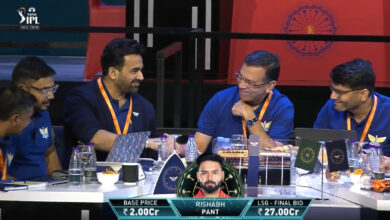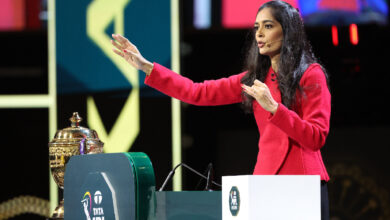From knives hurled at him to persing with a broken collarbone, the tales that put Franz Beckenbauer with Pele and Maradona as football’s greatest | Football News

He may not have conformed to the established archetype of a global phenomenon of a footballer – the likes of which came and since his time have come from Brazil and Argentina – but Franz Beckenbauer is one of the most important figures to have revolutionalised the sport in the 20th century. The German seemed natural on the ball and yet, his was a reputation grafted on hard work rather than god-gifted talent, on technique rather than skills.In a world that had already witnessed Pele grace the field and was about to witness the greatness of a Diego Maradona, Beckenbauer instilled the value of practice and repetition – and yet, looking effortless. And it was in his elegant beliefs that the German football would craft its image in the years to come.
But for the boy who grew up in a bombed out and scarred Germany post the Second World War, the path to become the man who won it all was all but normal. After his passing at the age of 78, The Indian Express looks at five moments that made Der Kaiser a larger than life footballer.
Most honest teammate he had
The very origins of Beckenbauer’s ideology of repetition tell us all we need to know about one of the football’s most accurate central midfielder and defender. His ability to canvas pinpoint passes wasn’t shaped overnight. World Cup winner with Germany in 2014, Toni Kroos had famously conceded that he “used to count the number of times Beckenbauer would misplace a pass” from his old match footage. Not many would be an understated answer. How though?
Growing up in Munich, a young Beckenbauer would spend hours and hours kicking a ball against a brick wall. Years later he’d confess, “That wall was the most honest team-mate I could ever have wished for. Whenever you played a proper pass to it, you’d get a proper pass back and didn’t need to run.” In hindsight one can now understand what Der Kaiser – the Emperor – meant when he said, “If I know where the ball is, I simply have no need to look down for it.”
Knives out
Bayern Munich was languishing in the second division of German football when Beckenbauer signed for the humble club. the time he left the club in 1977, they had won four Bundesliga, as many DFB Pokal Cup, and three European Cups. This, adopting a free-flowing and pleasing-to-the-eye style of play. Through his and Bayern’s journey to the top, the opposition crowds would let their frustrations known. Such was their success in the 1970’s that on more than once occasions, they were greeted with knives – thrown at them at away grounds. The passes – cutting through the opposition lines (pun intended) – though, never stopped.
Trivela’s finest
There’s this eight minutes 48 seconds long video of the German on YouTube titled, ‘Franz Beckenbauer but he can only use outside of the boot’. A neatly cut montage that does an excellent job in acquiring a decent few frames from matches which date back largely to the 70s. But one shouldn’t make that video’s length as an indication of just how much – and how precisely – Beckenbauer cast off trivelas.
For a defender – one whom none other than Pele had termed as the toughest he’d ever played against – Beckenbauer was more than adept with his attacking touches. He’d honed the skill to switch the play to the other flank – and the opposition couldn’t see it coming – thanks to those neatly wolven outside-of-the-boot passes. But not just that, Beckenbauer even modernised the trivelas as means to scoring goals. His first goal for Bayern had come off the same technique – hit from outside the box, curling in to beat the defender marked in front before viciously spinning the other way to end up in the bottom corner.
But it was really his goal against Duisburg in the 1973/74 season that highlighted his finesse. A free kick outside the box, which Beckenbauer approached running away from the dead ball – his body weight transferred to the other side as well – before a deftest of chips over the wall went the other way. Long before Roberto Carlos had bamboozled us mortals with his weird physics of a free kick, Der Kaiser let the world know there was another side of the boot to score goals from.
Broken collarbone? No worries
The year was 1970. It was a World Cup semifinal against Italy – later dubbed as the ‘match of the century’. A game which went into extra time, eventually saw seven goals split four to three in favor of Italy, was summed up one of the Italian dailies in two words, ‘Panzers stopped’. Remember, the geopolitical tensions between the two countries had barely cooled down. At the iconic Azteca Stadium, the Germans had lost but earned a football emperor they could be proud of.
Brunting the pain of a dislocated shoulder, Beckenbauer decided to continue on the pitch – slinging up his arm to see through all of 120 minutes and added time. The grainy pictures of him fashioning the untidy stripes over his number four shirt have endured through the sands of time almost as well as he did through the iconic game.
Ticking all the boxes
It is oft said in the sporting world that out of the many who play in the top echelons, few can run it as well from behind the scenes. As of 2023, a total of 471 players have had the privilege of winning the FIFA World Cup, three of them have done it as a player and a coach, but only one of them went on to bring home the cup as an adminrator.
Having won it as a player in 1974 and a coach in 1990, Beckenbauer flexed his adminrative pull in successfully heading the bid for Germany to host the 2006 World Cup. Coincidentally, it was the first time the country hosted the tournament since fall of the Berlin wall, prior to which West Germany had done so in 1974.
Almost a decade after the tournament, the bid led to a FIFA criminal investigation, pursuing bribery charges against Beckenbauer among others – a case that did put a dent to his reputation in his final years. However, such was his prowess that even as the President of a 21st century powerhouse club in Bayern Munich, Beckenbauer continued as one of football’s top TV pundit and column – a conflict of interest all means. For everyone but the emperor, it can be said in hindsight.







